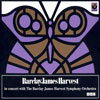BARCLAY JAMES HARVEST : ... BBC IN CONCERT 1972
- Mocking Bird
- Medicine Man
- Moonwater
- Summer Soldier
- The Poet
- After The Day
- Galadriel
- Dark Now My Sky
Label : Harvest
Venue : The Paris Theatre, London, UK
Recording Date : November 16, 1972
Release Year : 2012
Length : 55:30
Review (ProgArchives) : This is vintage BJH, the only known recording of the band playing live with their own orchestra. What a fascinating document it is too. Recorded before a small audience in BBC's radio theatre in November 1972, it was intended for broadcast as part of their 'In Concert' series of influential one-hour shows. The cramped circumstance of the setting caused many problems with sound balancing, exacerbated by the BBC's decision to record direct to 2-track rather than a multi-track. Thus, mixing decisions taken on the day are what we remain stuck with today. Quality is amazingly good for something that languished in the vaults for years. There is little hint of the tape's age: it is virtually noise and hiss free so thumbs up for Peter Mew at Abbey Road who performed the re-mastering. My only criticisms would be levelled at the source material which has good-ish dynamic range but is rather weak at the bass end, and it does get somewhat out of control when everybody plays full tilt. The mix is mostly adequate, though the unnamed engineer had most difficulty balancing individual vocalists against the varying output of orchestra and band. Performances are generally good, though the older songs are more assured. This recording took place just 5 days after the release of Baby James Harvest: while Woolly's solo-with-orchestra Moonwater is very dramatic and quite possibly better than the studio original, Summer Soldier sounds half-formed and a little primitive in some of its instrumental sections. Mocking Bird and Galadriel are reasonably faithful renditions of the studio recordings, though John's vocals begin a little tentatively on the latter. Les also seems to suffer a little stage-fright during the otherwise excellent polished version of Dark Now My Sky but he soon settles into it. Medicine Man is a hybrid successfully combining the studio orchestration with the rockier translation as epitomised by the band-only version on Live (1974). The Poet/After The Day begins in fine fashion with Woolly singing over the orchestra, but loses its edge in a messy bridge section where orchestra and band seem to vie for supremacy. The orchestra contribute significantly to After The Day too, but again it almost comes unstuck in the extended coda. Inevitably, this is something of a mixed bag. I love live recordings and find this fascinating as an alternative to more familiar renditions, particularly tracing the development of Medicine Man from understated orchestral origins to its ultimate riff-based form with extensive soloing. In other cases, perhaps the constraints of working with an orchestra caused some of the arrangements to stay closer to familiar studio versions. The album was initially issued as a limited edition 2CD set with two different mixes, one mono the other stereo, subsequently being re-issued as a single CD of the mono version only. Only the latter is still available. Overall, this album represents BJH at their most progressive, providing a compelling insight into this aspect of the band's career for those already familiar with these songs in other formats.
